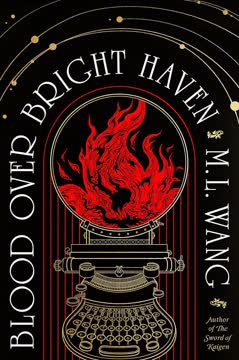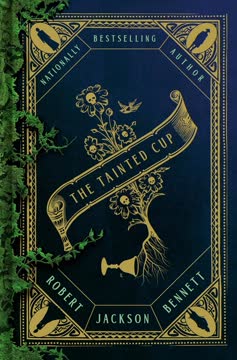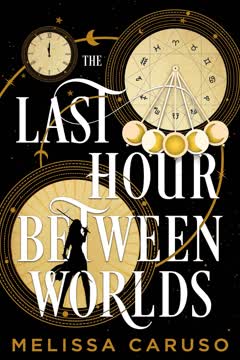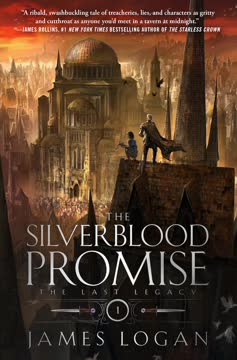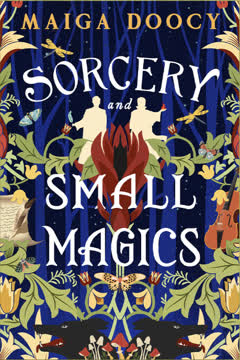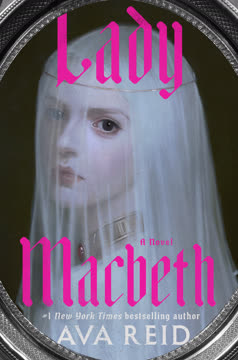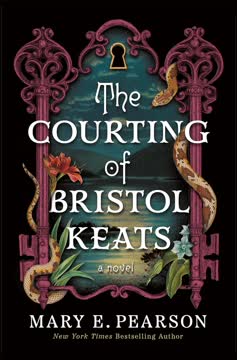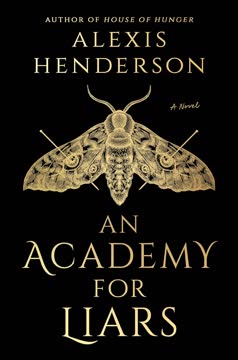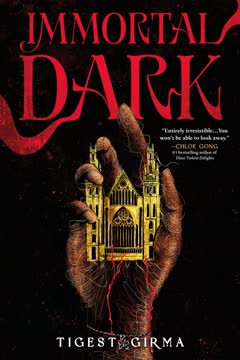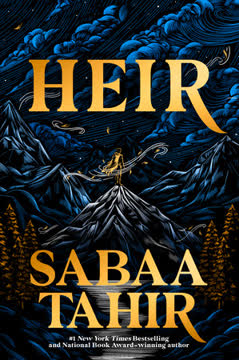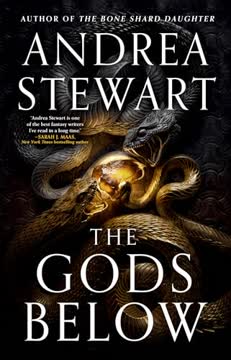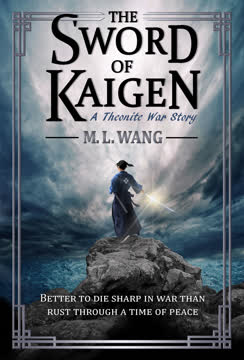Plot Summary
The Last Crossing
The story opens on the frozen plains of the Kwen, where the last remnants of the Caldonnae tribe, led by Thomil, his sister Maeva, and her daughter Carra, attempt a perilous crossing to the city of Tiran. The magical barrier that protects Tiran from the deadly Blight is their only hope, but the crossing is a massacre. Blight strikes, unraveling bodies in spirals of light, and the ice breaks, claiming nearly all. Only Thomil and young Carra survive, battered and orphaned, as they collapse on the other side of the barrier. Their arrival in Tiran is not a rescue but an entry into a new kind of servitude, as the city's guards coldly assess their worth as laborers. The trauma of loss and the cold indifference of Tiran set the tone for the story's exploration of survival, grief, and the cost of hope.
A Woman's Ambition
In Tiran, Sciona Freynan, a brilliant but socially awkward mage, prepares for the High Magistry exam—the first woman in a decade to attempt it. Driven by a relentless need for achievement and recognition, Sciona is both inspired and burdened by the knowledge that her success or failure will shape opportunities for all women after her. Her family, especially her cousin Alba and Aunt Winny, support her in their own ways, but Sciona's focus is singular: to break into the highest ranks of magical research. The city's technological marvels and the university's grandeur are both a source of pride and alienation for her, as she senses the weight of tradition and the skepticism of her male peers. Her ambition is both her strength and her isolation.
The Highmage Exam
Sciona faces the grueling High Magistry exam, competing against privileged male candidates, including the legacy Jerrin Mordra. The exam tests not only magical skill but also the ability to withstand the Council's scrutiny and subtle sabotage. Sciona's expertise in mapping and sourcing magic sets her apart, but her gender makes her a target for skepticism and outright hostility. She performs brilliantly, even as the Council tries to trip her up with impossible tasks. In a climactic moment, she overpowers a dangerous spell, defying orders and risking disqualification. Ultimately, her mentor Bringham's advocacy and her undeniable talent win her a place as the first female highmage, but the victory is bittersweet, shadowed by the knowledge that her every move will be watched and judged.
The Price of Power
As Sciona begins her work in the High Magistry, she is met with coldness, mockery, and sabotage from her male colleagues, especially Cleon Renthorn. Assigned a Kwen janitor, Thomil, as her assistant in a cruel joke, Sciona chooses to keep him, finding in him a rare listener and a mind capable of following her complex magical theories. Their partnership grows, marked by mutual respect and the slow revelation of each other's traumas. Sciona's drive to innovate is undiminished, but she is forced to confront the loneliness and moral compromises that come with power. The Magistry's culture of exclusion and the city's casual cruelty toward the Kwen become increasingly apparent.
The Unseen Cost
As Sciona and Thomil work together, they uncover disturbing truths about the source of Tiran's magical energy. Mapping spells, when pushed beyond their traditional limits, reveal that the Otherrealm—the supposed source of infinite energy—is in fact the lands beyond the barrier, home to the Kwen and other peoples. Every act of magic siphons life from these lands, causing the Blight that devastates the Kwen. The realization is shattering for both: for Thomil, it confirms his people's suffering is no accident; for Sciona, it means her life's work is built on murder. The knowledge is a poison that seeps into their relationship and their sense of self, forcing them to question the morality of their society and their own complicity.
The Freynan Method
Driven by obsession and guilt, Sciona develops a revolutionary mapping spell—the Freynan Mirror—that allows mages to see the Otherrealm in unprecedented clarity. With Thomil's help and insights into Kwen magical traditions, she adapts ancient, forbidden techniques, breaking the religious and legal taboos that have kept the truth hidden. The new spell reveals not just energy, but the living beings—plants, animals, and people—being destroyed by Tiran's magic. The breakthrough is both a triumph and a curse, as it brings the horror of the city's prosperity into undeniable focus. Sciona's innovation becomes a weapon against the lies of the Magistry, but it also isolates her further, as her colleagues and even her family recoil from the implications.
The Kwen and the Mage
Sciona and Thomil's partnership deepens as they share knowledge, pain, and the burden of truth. Their backgrounds—one a privileged Tiranishwoman, the other a survivor of genocide—clash and complement, forcing each to confront their prejudices and limitations. Thomil's insights into Kwen morality and history challenge Sciona's faith in her culture and her god. Their relationship, fraught with power imbalances and mutual need, becomes a rare space of honesty and vulnerability. As they work together to expose the truth, they also find in each other a hope for redemption and a vision of a different future, even as the world around them grows more dangerous.
Truths and Delusions
Sciona brings her discoveries to her mentor Bringham and the Magistry Council, hoping to reform the system from within. Instead, she is met with denial, rationalization, and threats. The Council, including Bringham, admit they have always known the truth but justify it as God's will and a necessary sacrifice for civilization. Sciona is told to accept the burden of knowledge and keep silent, as all "great mages" must. The encounter is devastating, shattering her last illusions about the possibility of change from within. She realizes that the system is designed to perpetuate itself, and that her own rise was only ever meant to serve as a token, not a true transformation.
The Mirror Opens
Refusing to be complicit, Sciona uses her Freynan Mirror spell to broadcast the truth to all of Tiran. At the stroke of noon, every magical device in the city displays the real cost of magic: the deaths of plants, animals, and people beyond the barrier. The city erupts in horror, denial, and violence. The Kwen rise in revolt, Tiranish citizens panic, and the Magistry moves to suppress the truth and punish Sciona. The revelation does not bring immediate justice or understanding; instead, it exposes the deep rot at the heart of Tiran and the fragility of its peace. Sciona is arrested, and the city descends into chaos.
The Guilt of Knowledge
In the aftermath, Sciona is abandoned by her family and friends, who cannot forgive her for shattering their world. Alba, her beloved cousin, denounces her, and even her mentor Bringham turns away, more concerned with his own legacy than with justice. Sciona is left alone to face trial and execution, wracked by guilt and doubt. Meanwhile, Thomil and Carra, now fugitives, must decide whether to use Sciona's final, most dangerous spell—a weapon that could destroy the Magistry but at the cost of becoming murderers themselves. The chapter is a meditation on the limits of good intentions, the weight of complicity, and the loneliness of those who choose truth over comfort.
The City in Flames
As Sciona stands trial, the city burns. The Kwen, long oppressed and now awakened to the truth, rise up in violent revolt. The Magistry responds with brutal force, using the very magic that caused the suffering to crush dissent. Sciona's last hope for peaceful change is extinguished as she realizes that the system will not yield to reason or compassion. The city's collapse is both a tragedy and a reckoning, as the lies that sustained it are consumed by the fire of truth and vengeance. In the chaos, the lines between victim and perpetrator blur, and survival becomes the only law.
The Trial of Truth
Sciona is tried before the High Magistry, accused of heresy, incitement, and betrayal. The trial is a farce, with the outcome predetermined: she is sentenced to death. In her final moments, Sciona refuses to recant or beg for mercy, instead challenging the Council to face the truth and use her discoveries to build a better future. Her courage is met with contempt and fear. As she drinks the poison, she is at peace with her choices, knowing she has done what she could to break the cycle of lies, even if it costs her everything.
The Last Spell
As Sciona dies, Thomil and Carra, after agonizing debate, activate her final spell: a massive siphoning that targets the Magistry itself. The barrier expands, consuming the city's leaders in the same Blight they unleashed on the Kwen. The act is both vengeance and a desperate hope for change—a way to end the old order and give the survivors a chance at something new. The cost is immense, and the future uncertain, but for the first time, the cycle of taking is broken. Thomil and Carra, joined by other Kwen, flee the city, carrying with them the memory of those lost and the possibility of a different world.
The Taking Is Done
In the wake of the Magistry's destruction, the survivors—Kwen and Tiranish alike—must reckon with the ruins of their world. Thomil and Carra, now free but exiled, lead a group of Kwen into the mountains, seeking a new beginning beyond the reach of Tiran's magic. The story ends with a prayer: that the suffering and sacrifice will not be in vain, that the truth will not be forgotten, and that one day, the taking will give way to giving. The legacy of Sciona Freynan and the last of the Caldonnae is not one of conquest, but of hope and the courage to face the truth, no matter the cost.
Characters
Sciona Freynan
Sciona is the first female highmage in Tiran's history, driven by an insatiable hunger for achievement and recognition. Her brilliance in magical theory and innovation is matched only by her social awkwardness and emotional isolation. Raised by her aunt and cousin after being abandoned by her father, Sciona's ambition is both a shield and a wound. Her journey is one of increasing disillusionment: as she rises in the Magistry, she uncovers the horrific cost of Tiran's magic and is forced to confront her own complicity. Sciona's psychological arc is defined by her struggle between ego and conscience, her need for connection, and her ultimate willingness to sacrifice everything for the truth. Her relationship with Thomil, marked by mutual respect and vulnerability, becomes a rare source of hope and redemption, even as it is fraught with the power imbalances of their world.
Thomil Siernes-Caldonn
Thomil is the last adult of the Caldonnae tribe, haunted by the trauma of the crossing and the loss of his family. Forced into servitude in Tiran, he is assigned as Sciona's assistant in a cruel joke but proves to be her intellectual equal and moral compass. Thomil's stoicism masks deep grief and anger, and his loyalty to his niece Carra is unwavering. His relationship with Sciona is complex: he admires her mind but challenges her assumptions, pushing her to see the world beyond her privilege. Thomil's psychological journey is one of moving from numb survival to active resistance, culminating in his decision to use Sciona's final spell against the Magistry. His actions are driven by a fierce love for his people and a hard-won hope that the cycle of suffering can be broken.
Carra
Carra is Thomil's niece and the last child of the Caldonnae, scarred physically and emotionally by the Blight and the loss of her parents. Raised in Tiran's slums, she is tough, resourceful, and unafraid to speak her mind. Carra's anger at the world's injustice is both a defense and a weapon, and she is quick to violence when threatened. Her relationship with Thomil is both loving and fraught, as she resents the compromises he makes for survival. Carra's arc is one of coming into her own power, choosing action over despair, and carrying the legacy of her people into an uncertain future.
Archmage Bringham
Bringham is Sciona's mentor and the archmage who champions her rise in the Magistry. Outwardly kind and supportive, he is a master of rationalization, justifying the Magistry's crimes as necessary for progress and civilization. Bringham's psychological complexity lies in his ability to compartmentalize: he genuinely cares for Sciona but is ultimately more invested in his own legacy and the stability of the system. His relationship with Sciona is paternal but ultimately self-serving, as he seeks absolution for his own complicity through her achievements. Bringham's arc is a tragic one, as his inability to face the truth leads to his downfall.
Cleon Renthorn
Renthorn is Sciona's chief rival in the Magistry, a legacy mage who embodies the entitlement and cruelty of Tiran's elite. He is both brilliant and vicious, using his power to torment subordinates and pursue his own advancement. Renthorn's psychological makeup is defined by his lack of empathy and his thrill in domination, both magical and personal. His interactions with Sciona are marked by hostility, sexual aggression, and a twisted admiration for her talent. Renthorn's end is fittingly violent, as he is destroyed by the very forces he sought to control.
Jerrin Mordra
Jerrin is the son of an archmage, thrust into the Magistry by birthright rather than merit. He is nervous, eager to please, and out of his depth among the city's true power players. Jerrin's arc is one of bewilderment and horror as he witnesses the collapse of the world he took for granted. In the end, he is spared by Thomil and Carra, left to inherit the ruins of the Magistry and the burden of memory. His survival is both a chance for redemption and a reminder of the randomness of fate.
Alba
Alba is Sciona's cousin and closest family, a practical, hardworking woman who supports Sciona's ambitions even as she struggles to understand them. Alba represents the perspective of the city's working class, invested in stability and wary of upheaval. Her relationship with Sciona is loving but strained, especially as Sciona's actions bring chaos and danger to their lives. Alba's arc is one of betrayal and heartbreak, as she is forced to choose between family and the world she knows.
Aunt Winny
Aunt Winny raises Sciona after her mother's death, providing unconditional love and support. She embodies the values of care, sacrifice, and community, but also the limitations of tradition and denial. Winny's inability to accept the truth about Tiran's magic mirrors the city's collective refusal to face its sins. Her relationship with Sciona is a source of comfort and pain, as the gap between their worlds grows unbridgeable.
The Magistry Council
The Council is a collective character, representing the entrenched authority of Tiran. Each member is a variation on the theme of rationalization, self-interest, and fear of change. They are skilled at justifying their actions as God's will and the greater good, but their unity is brittle, shattered by the revelation of the truth. The Council's psychological profile is one of collective narcissism and moral cowardice.
The Kwen People
The Kwen, as a collective, are the silent majority whose suffering powers Tiran's magic. Their history of loss, resilience, and hope is embodied in characters like Thomil and Carra, but also in the countless unnamed who die unseen. The Kwen's arc is one of awakening and revolt, as the truth finally gives voice to their pain and the possibility of a future beyond victimhood.
Plot Devices
Dual Narrative Structure
The novel alternates between Sciona's rise in the Magistry and Thomil's struggle as a Kwen survivor, using their intersecting stories to explore themes of power, complicity, and resistance. This structure allows the reader to see the same world from radically different perspectives, highlighting the blindness of privilege and the resilience of the oppressed. The convergence of their narratives in the Freynan Mirror and the final spell is both a literal and symbolic union of knowledge and action.
Magical Realism as Social Critique
The world's magic system is intricately tied to the social and political order, with the act of siphoning energy serving as a metaphor for exploitation and colonialism. The mapping spells, especially the Freynan Mirror, function as both plot devices and symbols: they reveal the hidden cost of progress and force characters (and readers) to confront uncomfortable truths. The gradual unveiling of the Otherrealm's reality is foreshadowed through Sciona's research and Thomil's memories, building tension toward the moment of revelation.
Foreshadowing and Irony
The narrative is laced with foreshadowing: the trauma of the crossing, the hostility of the Magistry, the recurring theme of "truth over comfort." Sciona's ambition is repeatedly shown to be both her strength and her undoing, as her innovations bring not salvation but catastrophe. The irony of her rise—meant to be a triumph for women and progress—becoming the catalyst for the city's destruction is central to the story's critique of power and good intentions.
The Mirror Motif
Mirrors, both literal and metaphorical, recur throughout the novel: the Freynan Mirror, the city's self-image, the characters' confrontations with their own reflections. The act of seeing—what is revealed, what is denied, what is rationalized—is the core plot device, driving both personal and societal transformation. The final act of broadcasting the truth to the city is the ultimate use of the mirror, shattering illusions and forcing a reckoning.
The Cycle of Taking and Giving
The recurring theme of "the taking is done" frames the story's exploration of cycles: of violence, of exploitation, of hope and despair. The characters' actions—whether survival, ambition, or vengeance—are all forms of taking, justified or not. The story's resolution, with Thomil and Carra leading the survivors into the mountains, gestures toward the possibility of a new cycle, one in which giving and renewal might replace endless taking.
Analysis
Blood Over Bright Haven is a searing examination of the costs of progress, the blindness of privilege, and the courage required to face uncomfortable truths. Through the intertwined journeys of Sciona and Thomil, the novel exposes the hidden violence that sustains civilization and the ways in which systems of power perpetuate themselves through denial, rationalization, and the exploitation of the vulnerable. The magic system, with its literal siphoning of life from the marginalized, is a powerful metaphor for colonialism, patriarchy, and the environmental and human costs of technological advancement. The story refuses easy answers: Sciona's quest for reform ends in tragedy, and the city's reckoning is as much a catastrophe as a liberation. Yet, in the ashes, there is hope—not in grand gestures or perfect solutions, but in the small acts of honesty, solidarity, and the willingness to break the cycle of taking. The novel challenges readers to consider what it means to be complicit, what it means to resist, and whether true change is possible without first seeing ourselves, and our world, as they truly are.
Last updated:
Review Summary
Blood Over Bright Haven is a highly acclaimed dark academia fantasy novel that explores themes of sexism, racism, and colonialism. Readers praise Wang's intricate magic system, complex characters, and thought-provoking narrative. The book is lauded for its nuanced approach to moral dilemmas and social commentary. Many reviewers compare it favorably to Wang's previous work, The Sword of Kaigen, and consider it a masterpiece in standalone fantasy. While some found the pacing slow or the themes heavy-handed, the majority of readers were deeply impacted by the story's emotional depth and intellectual challenges.
Similar Books
Download PDF
Download EPUB
.epub digital book format is ideal for reading ebooks on phones, tablets, and e-readers.
